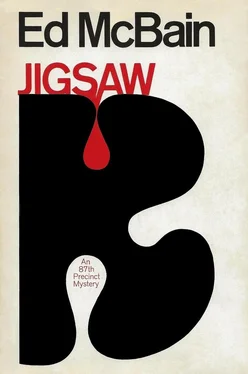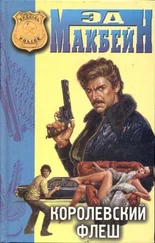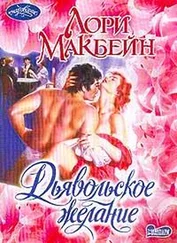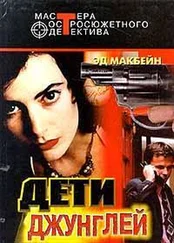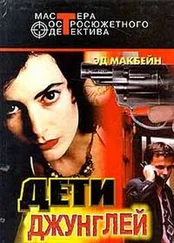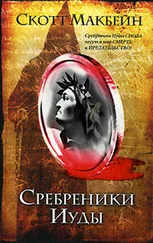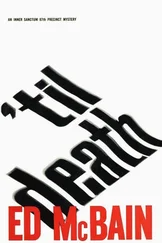“No,” he said. “What gave you that idea?”
“You’re big like a cop,” she said, and shrugged. “Also, you carry a gun.”
“Do I?”
“Mm-huh. Right there,” she said, and pointed.
“I didn’t think it showed.”
“Well, Harold was in the diamond business, and he had a carry-permit, and he used to wear this enormous revolver in a shoulder holster, right where yours is. So I guess when your husband wears a gun all the time, you get used to the way it looks, and that’s how I spotted yours right away. Why do you wear a gun, Arthur? Are you in the diamond business?”
“No,” he said, “I’m in the insurance business.”
He figured that was a fair enough beginning, even though he had borrowed the occupation from Irving Krutch who, to his knowledge, did not carry a gun.
“Oh, do insurance men wear guns?” Gerry asked. “I didn’t know that.”
“Yes,” he said, “if they’re insurance investigators.”
“Don’t tell me!” she squealed. “Someone’s had a painting stolen! You’re here to check on authenticity.”
“Well, no,” he said. “Not exactly.”
“Arthur,” she said, “I think you’re a cop, I really do.”
“Now why would a cop be visiting you, Miss Ferguson?”
“Gerry. Maybe because I charge such exorbitant prices,” she said, and smiled. “I don’t really. Yes, I do really. Would you like to see some pictures while you decide if you’re a cop or not?”
She led him around the gallery. The walls were white, with recessed overhead lighting fixtures that illuminated the hanging paintings and standing pieces of sculpture. Her taste in paintings was a bit far-out for Brown, wildly colorful, non-objective geometric tangles that overpowered the eye and defied analysis. The sculpture was of the junkyard variety, automobile headlights welded to Stillson wrenches, a plumber’s red-cupped plunger wired to the broken handle and frayed-straw brush of a broom.
“I can see we’re hardly eliciting any wild response,” Gerry said, and smiled. “What kind of art do you like?”
“Well, I did have a specific picture in mind,” Brown said.
“Did someone see it here?” she asked. “Would it have been in the Gonzago exhibit?”
“I don’t think so.”
“What kind of a painting is it?”
“It isn’t a painting. It’s a photograph.”
Gerry shook her head. “It couldn’t have been here. We’ve never had a photographic show, not since I’ve owned the gallery, anyway — and that’s close to five years.”
“It’s not even a whole photograph,” Brown said, and watched her.
“Oh- ho, ” she said. This time, she didn’t smile. “What happened to the other guy?”
“What other guy?”
“The guy who’s been in here three or four thousand times in the past two months. He’s yay tall, and he’s got blondish curly hair, and he said his name was Al Reynolds the first time he came in, and then forgot what he’d told me and said his name was Al Randolph the second time around. Is he a cop, too?”
“We’re neither of us cops.”
“Mr. Stark...”
“Stokes,” Brown said.
“Just checking,” Gerry said, and grinned. “Mr. Stokes...”
“Arthur...”
“Arthur, I don’t have what you’re looking for. Believe me. If I had it, I’d sell it to you. Assuming the price was right.”
“The price can be made right.”
“How right is right?”
“You name a figure,” Brown said.
“Well, do you see that Albright on the wall there? It’s approximately four feet square, and the gallery gets ten thousand dollars for it. The smaller painting next to it, the Sandrovich, costs five thousand. And the tiny gouache on the far wall costs three thousand. How large is your photograph, Arthur?”
“I have no idea. Are we talking about the whole picture now, or just the piece you have?”
“The whole picture.”
“Five by seven? Six by eight? I’m guessing.”
“Then you’ve never seen the whole picture?”
“Have you?”
“I haven’t even seen the tiny piece you’re after.”
“Then how do you know it’s tiny?” Brown asked.
“How much is it worth to you and your friend, Arthur? Tiny or otherwise?”
“Have you got it?”
“If I told him no, why should I tell you yes?”
“Maybe I’m more persuasive.”
“Sure, look at Superspade,” Gerry said, and smiled. “Faster than a rolling watermelon, able to leap tall honkies in a single bound...”
“...who is in reality,” Brown continued, “mild-mannered Arthur Stokes of Ebony magazine.”
“Who are you really in reality, Arthur?”
“An insurance investigator, I told you.”
“Your friend Reynolds or Randolph or whoever-the-hell doesn’t look or sound like an insurance investigator.”
“No two insurance investigators look or sound alike.”
“That’s right. Only cops and crooks look and sound alike. Are you and your friend cops, Arthur? Or crooks? Which?”
“Maybe one of us is a cop and the other’s a crook.”
“Either way, I don’t have what you want.”
“I think you have.”
“You’re right,” a voice said from the rear of the gallery. “She has.”
“Oh, hell,” Gerry said.
Brown turned to where a blue door had opened in the otherwise white wall. A blond man in a brown suit stood in the open doorway, his hand still on the knob. He was about five feet ten inches tall, wearing a vest under the suit jacket, gold-rimmed eyeglasses, a brown-and-gold striped tie. He walked briskly to where they were standing, offered his hand to Brown, and said, “Bramley Kahn, how do you do?”
“Bram, you’re a pain in the ass,” Gerry said.
“Arthur Stokes,” Brown said. “Pleased to meet you.”
“If we’re going to talk business...”
“We are not going to talk business,” Gerry interrupted.
“I suggest,” Kahn continued in his mild voice, “that we go into the office.” He paused, glanced at Gerry, looked back at Brown, and said, “Shall we?”
“Why not?” Brown said.
They walked to the rear of the gallery. The office was small and simply decorated — a Danish modern desk, a single naturalistic painting of a nude on the wall opposite the desk, a thick gray rug, white walls, a white Lucite hanging light globe, several leather-and-chrome easy chairs. Gerry Ferguson, pouting, sat nearest Kahn’s desk, folding her legs up under her and cupping her chin in her hand. Brown took the seat opposite Kahn, who sat behind the desk in an old-fashioned swivel chair that seemed distinctly out of place in such svelte surroundings.
“I’m Gerry’s partner,” Kahn explained.
“Only in the gallery, ” Gerry snapped.
“I’m also her business adviser.”
“I’ve got some advice for you, ” Gerry said heatedly. “Keep your nose...”
“Gerry has a temper,” Kahn said.
“Gerry has a jerk for a partner,” Gerry said.
“Oh, my,” Kahn said, and sighed.
Brown watched him, trying to determine whether he was a fag or not. His manner was effete, but not quite feminine; his voice was gently modulated, but there was no evidence in it of characteristic homosexual cadences; his gestures were small and fluid, but he neither dangled a limp wrist, nor used his hands and shoulders like a dancer’s. Brown couldn’t tell. The biggest queen he’d ever known had been built like a wrestler and moved with all the subtle grace of a longshoreman.
“What about the picture?” Brown asked.
“She has it,” Kahn said.
“I haven’t,” Gerry said.
Читать дальше
